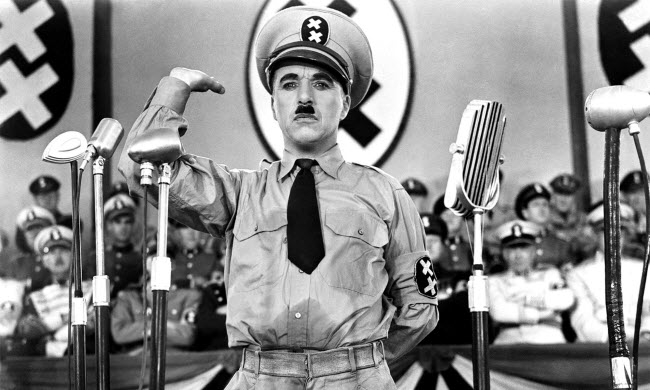The Great Dictator is considered one of the timeless films in the history of world cinema. When watching it, you might be in great confusion: should you laugh at its humorous scenes or cry over the message it seeks to convey? It is a cinematic masterpiece created by one of the greatest actors, writers, and directors of the twentieth century, Sir “Charlie Chaplin.” He reflected a historical figure that the world cannot forget, “Adolf Hitler,” during a critical time at the peak of World War II events that were sweeping Europe and the world, all presented in a satirical manner.

In the 1930s, many cartoonists and even writers drew a link between the German leader “Adolf Hitler” and the English actor “Charlie Chaplin,” as they both had similar mustaches, and not only in appearance; both were born in the same year and the same month, with a four-day difference in April 1889. Both rose to better positions after a miserable life of poverty. “Hitler” and his Nazi party emerged at the same time “Charlie Chaplin” enjoyed global popularity. According to his son in the book “My Father,” although they shared many similarities, they were poles apart, with one making millions cry while the other made them laugh.

In 1931, “Chaplin” visited Berlin but faced significant backlash from the Nazis, who were greatly displeased with his comedic style. The matter didn’t stop there; they published a book in 1934 titled “The Jews Look at You,” mocking Chaplin and ridiculing him, even describing him as the disgusting Jewish clown, despite the fact that he wasn’t Jewish. “Ivor Montagu,” a close friend of Chaplin, sent him a copy of the book to read. It seems Chaplin decided to respond in his own way, by making their leader “Hitler” a dictator in one of his satirical films.

“Chaplin” began his revenge by preparing the story for the film “The Great Dictator” throughout 1938 and 1939. The actual filming began in September 1939, just one week after the outbreak of World War II, and finished almost a year later. To further provoke Hitler, some of the signs in the Jewish quarter shops in the film were written in Esperanto, a language Hitler condemned as a Jewish conspiracy to destroy German culture. Not only that, but Chaplin arranged for the film to be sent to “Hitler.” It was confirmed by someone close to the German leader that he indeed watched it, although there was no mention of his reaction. There are also other claims that he watched it twice. “Chaplin” commented that he was willing to do anything to know Hitler’s reaction to the film. However, it was recently revealed in some biographies of Eva Braun, Hitler’s mistress, that Hitler greatly enjoyed the private screenings of the film. He even declared that the dictator’s office in the film was very similar to his office in the Chancellery in Berlin, and the scene where Chaplin plays with the globe made him burst into laughter.

“The Great Dictator” was released in 1940 and was well-received in the United States at the time of its release, gaining popularity among American audiences. It became the second most popular film in the United States in 1941. Interestingly, during its production, the British government announced that it would ban its screening in the “United Kingdom” in line with its appeasement policy towards Nazi Germany. However, by the time the film was released, the United Kingdom was at war with Germany, and the film was partly welcomed for its obvious propaganda value, attracting 9 million viewers to cinemas, despite Chaplin’s concerns that a wartime audience might not appreciate a comedy about a dictator. The film was banned in some European countries that fell under German occupation, as well as in many Latin American countries due to the presence of active pro-Nazi movements. Nevertheless, despite being banned in several countries, it became Chaplin’s highest-grossing film, earning a total of $5 million worldwide.
